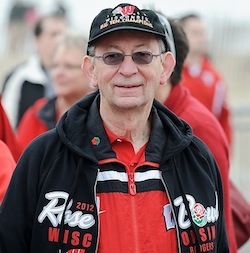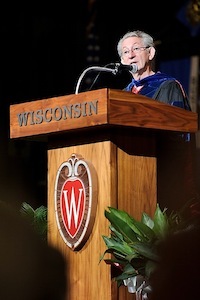Encore ending, Ward reflects on transition, innovation
When David Ward returned to UW–Madison as its interim chancellor in 2011, he took over after an acrimonious attempt to create a public authority to govern UW–Madison failed in the state Legislature and then-Chancellor Biddy Martin left for Amherst College.
And as he was wrapping up his work at UW–Madison in recent weeks, Ward was navigating another battle at the Capitol, working to try to protect the university’s interests in the just-signed budget, and to make sure incoming Chancellor Rebecca Blank doesn’t have to revisit the same challenges in the coming months.
Still, Ward concedes it’s difficult to leave UW–Madison, which has been so central to his career for more than four decades.
See Badger Voice’s ‘A Fond Farewell’ in words and photos
He does take satisfaction in having laid the foundation for a smooth leadership transition. And he remains passionate about the future of the university, which he says Wisconsin should view — and protect — as one of the world’s gems of public higher education.
The university “has this amazing stature in the world of higher education in a state that’s five million people of fairly average income, with not a particularly dynamic economy,” Ward says.
“I hope we don’t get into such self-deprecating hostilities with each other that we lose the fact [that] for 125 years, this place has served and enriched the state and represented Wisconsin worldwide. That’s why we attract good students and that’s why our people do well wherever they go and many continue to provide indispensible private support to their alma mater,” he says.

Ward enjoying Party at the Pier, a pep rally held at the Santa Monica Pier in advance of the 2012 Rose Bowl.
Ward, who had already served one term as UW–Madison chancellor from 1993-2000, had originally planned to be on campus as interim chancellor for one year. But when faculty, staff and students asked him to stay for second year, Ward realized he needed to be more than just a caretaker.
Part of his role involved improving the dialogue between the administration and governance groups, Ward says, adding that he’s leaving with them feeling better consulted and engaged.
“If my leadership has helped people to cope with difficult times better and feel like we made a good choice for an incoming chancellor, I leave feeling good about the succession and that it will be a smooth transition,” Ward says, adding that he and Blank talk often. “If I’ve been able to provide a kind of style of leadership that makes that option possible, the second year was worth it.”
He used his two-year opportunity to craft an agenda that included a focus on innovation. This focus confronted the way a UW–Madison education is delivered within — and without — the classroom, Ward says, and how the university defines and executes the transfer of knowledge to the public. Those initiatives were part of an effort to encourage self-generated change and acknowledge that the old funding model of public higher education is stressed.
“If you want to do good things, you can’t just wait around,” Ward says, adding that a number of faculty and staff picked up his charge. “There’s been some new money, but a lot of it has been intrinsic energy.”
“I hope we don’t get into such self-deprecating hostilities with each other that we lose the fact [that] for 125 years, this place has served and enriched the state and represented Wisconsin worldwide.”
David Ward
With the Legislature’s decision to put off the implementation of UW–Madison’s HR Design personnel system, Ward says, “these internally driven innovations were in line with reforms of our human resources system with specific flexibilities for UW–Madison, but the legislature sadly decided to delay implementation.”
And while Ward has had his hands full with serious issues and challenges, there was also room for a little fun — such as two Badger trips to the Rose Bowl — even if “we lost this time,” Ward says. “They had three wins in my first term.”
When Ward returned to campus in 2011, he brought with him the knowledge he gained from nearly a decade spent leading the American Council on Education (ACE), the most comprehensive association of higher education leadership, in Washington, D.C.
That experience gives him a broader perspective on the challenges facing UW–Madison, which he says aren’t unique to Wisconsin.
“This is a stressful time for public higher education nationwide,” Ward says. “We need to understand that and reflect on how it’s going elsewhere.”
To improve the discussion about higher education in Wisconsin — and to rebuild some trust with state lawmakers and residents — Ward is encouraging UW–Madison and the rest of the UW System to lead a conversation about tuition, financial aid and state support outside of the budget debate.

Ward speaks to thousands of first-year students during the Chancellor’s Convocation at the Kohl Center in 2011.
“We need to look at how to develop a tuition policy that makes sense for the next decade,” Ward says. “Tuition has kind of become like part of the ether — it’s a social concept, not like it’s an important part of the calculus of the cost of higher education.”
With just days to go in his tenure as interim chancellor, Ward is bouncing back from an emergency appendectomy in London, where he was attending a conference on higher education — with his resumed retirement in sight.
After he wraps up his work at UW–Madison, Ward and his wife, Judith, who has been active on boards in Madison during their return to campus (including at the Waisman Center, where she is helping to plan the center’s 40th anniversary celebration), will spend the rest of the summer at their cottage two hours north of Madison.
Then, the Wards will resume their life in Washington, where they lived for a decade. He calls Washington a “very livable city” — where his local theater is the Kennedy Center and he stops by to catch rehearsals of the symphony, and where he enjoys a range of local museums in his backyard. “If I want to go to the National Gallery on a Tuesday, I go,” he says.
The Wards will also pick up a busy travel schedule, visiting family in California and his native England. Ward says he’ll stay involved in higher education by doing some limited consulting work as he did for two years following his retirement from ACE.




